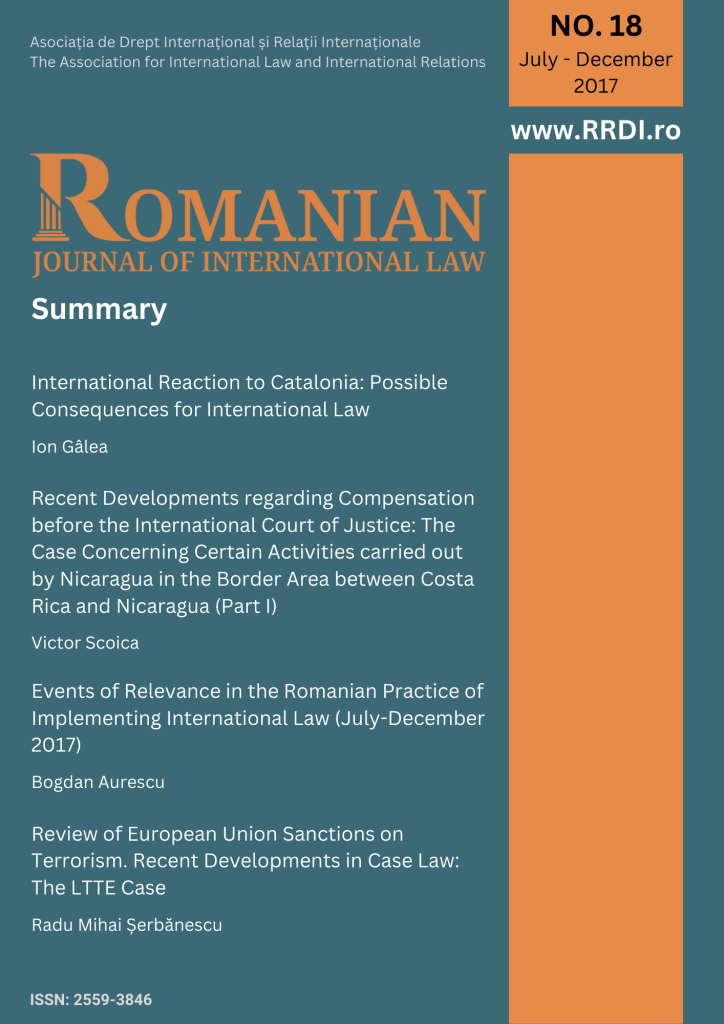International Reaction to Catalonia: Possible Consequences for International Law
Ion GÂLEA
This study aims at briefly examining the international reactions to the unilateral declaration of independence with respect to Catalonia, in order to identify possible trends or evolutions in international law. The article departs from the assumption that two main theories have been proposed with respect to the international law applicable to secession attempts and tries to identify elements that may support one theory or the other. The main aspects that will be looked upon when studying the reactions of States shall be references to: territorial integrity and sovereignty, conformity with the Constitution and the domestic laws, and the rule of law.
Recent Developments regarding Compensation before the International Court of Justice: The Case Concerning Certain Activities carried out by Nicaragua in the Border Area between Costa Rica and Nicaragua – Part I
Victor STOICA
This article studies the manner in which compensation is interpreted and how it currently applies before the International Court of Justice through the perspective of the Case Concerning Certain Activities Carried out by Nicaragua in the Border Area.
Events in the Romanian Practice of Implementing International Law (June-December 2017)
Bogdan AURESCU
This brief presentation of the Romanian practice during the second semester of 20172 in implementing international law tries to give an overview of what can be termed as a very rich activity of the Romanian authorities in this field. The paper describes the legal positions expressed on various occasions regarding events with relevance to international law, legal procedures regarding important agreements signed by Romania, Romania’s participation to the most important international organizations etc.
Review of European Union Sanctions on Terrorism. Recent Developments in Case Law: the LTTE Case
Radu-Mihai ȘERBĂNESCU
The purpose of this paper is to analyse the recent case law of the Court of Justice of the European Union with regard to the restrictive measures to combat terrorism. It will attempt to outline the primary conclusions drawn from this case law, as well as to evaluate the diverging views between the General Court and the Grand Chamber on the interpretation of the EU legal act governing terrorism sanctions. Departing from this debate, the paper will highlight the consequences of the prevailing views rendered by the Grand Chamber and how these will affect the future practice of EU in the field.
Commentaire d’arrêt : Obligations relatives à des négociations concernant la cessation de la course aux armes nucléaires et le désarmement nucléaire (Îles Marshall c. Royaume-Uni, 2016, CIJ)
Adrian-Nicușor POPESCU
L’arrêt de la Cour Internationale de Justice, rendu le 5 octobre 2016, a signalé l’approche formaliste de la Cour à l’égard de l’existence d’un différend d’ordre juridique. En fait, la Cour a introduit un nouveau critère pour qu’un différend entre deux États soit constaté : la connaissance de l’opposition exprimée par le demandeur. La décision a été contestée dans la doctrine et aussi dans les opinions dissidentes des juges qui ont voté contre le refus de la Cour d’accepter sa compétence. Cette réaction a été justifiée par l’important enjeu de l’affaire : l’obligation de négocier pour le désarmement nucléaire. Les critiques indiquent avec inquiétude les conséquences indésirables de l’arrêt: une inutile entrave à l’accès à la justice internationale, des soupçons de subjectivisme qui nuisent à l’image de la Cour et l’avenir ambigu des négociations pour le désarmement nucléaire.

